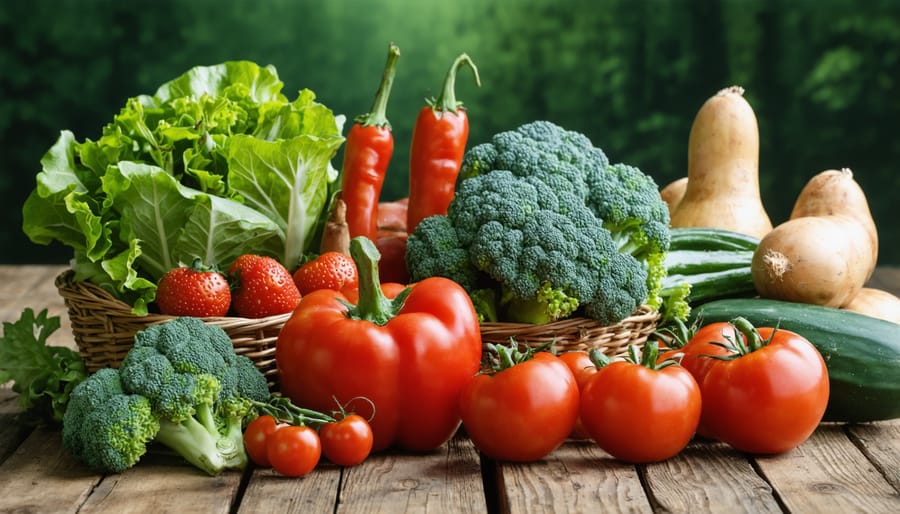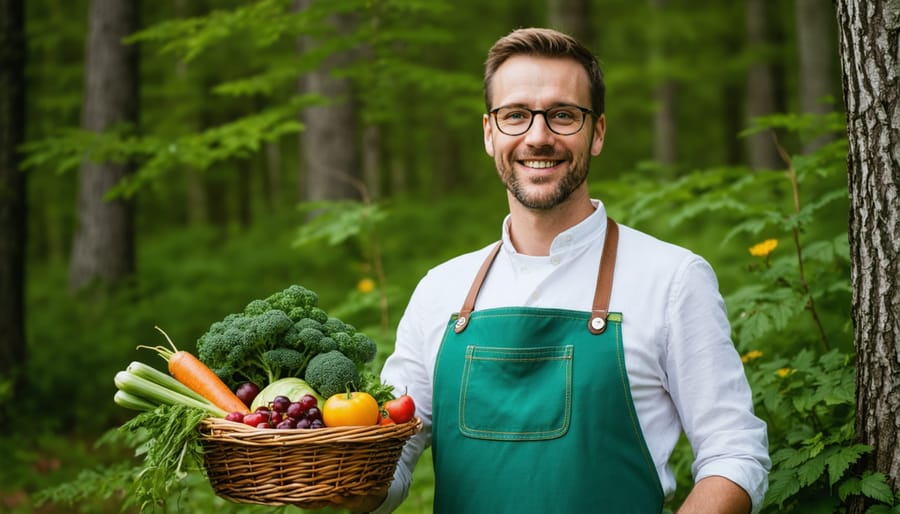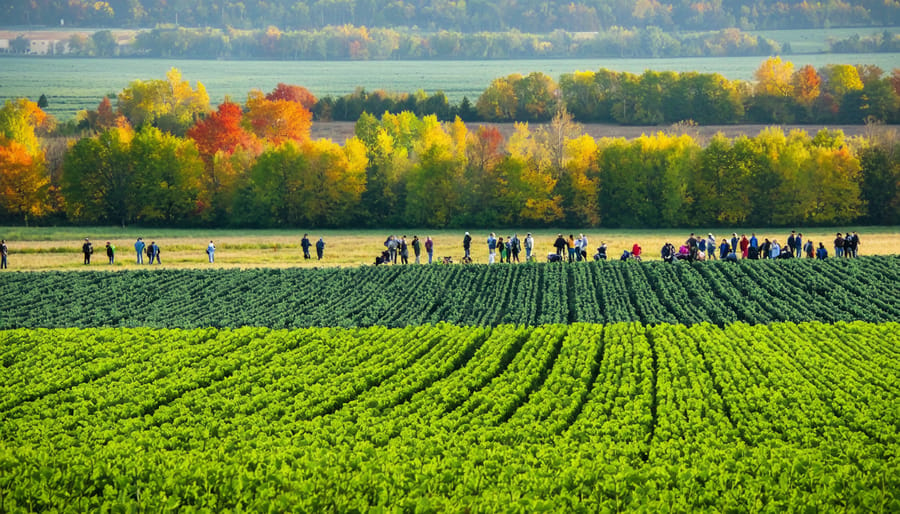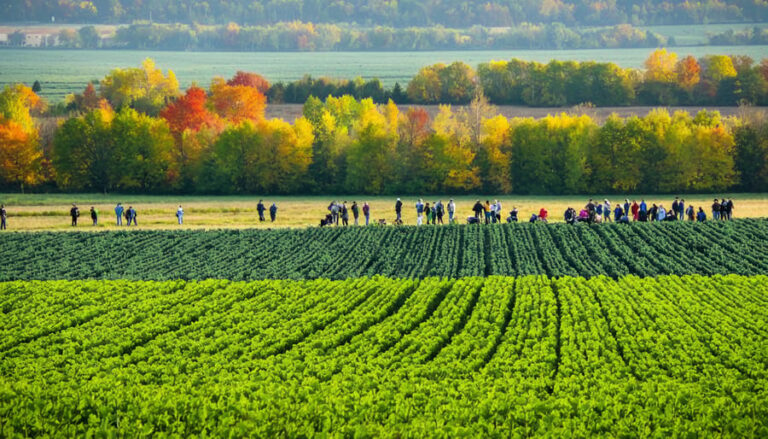Discover Ontario’s vibrant culinary landscape through mindful, eco-conscious experiences that celebrate both nature and local flavors. From foraging wild mushrooms with experienced guides in the Muskoka forests to participating in sustainable vineyard harvests in Prince Edward County, sustainable tourism practices are transforming how we explore our region’s food culture. Indigenous food tours reveal centuries-old harvesting traditions, while farm-to-table workshops connect visitors directly with local producers who prioritize regenerative agriculture. These immersive experiences not only satisfy your culinary curiosity but also support local communities and preserve our natural heritage. By choosing eco-friendly food adventures, you become part of a movement that’s revolutionizing tourism – one that values authentic connections, minimizes environmental impact, and creates lasting positive change in our food systems.
Ontario’s Farm-to-Table Experience
Meet Your Local Food Heroes
Meet the passionate individuals who are revolutionizing Ontario’s food landscape through their commitment to local environmental preservation and sustainable farming. At Thunder Creek Farms in Grey County, Sarah Thompson tends to her heritage vegetables using traditional Indigenous farming methods, offering visitors hands-on experiences in seed saving and organic cultivation.
In Prince Edward County, the Martinez family’s award-winning cheese operation showcases how modern sustainable practices can blend seamlessly with artisanal craftsmanship. Their solar-powered dairy facility welcomes tourists for guided tours and cheese-making workshops, demonstrating that exceptional flavor and environmental responsibility go hand in hand.
Don’t miss Betty Wilson’s apiary in the Ottawa Valley, where this third-generation beekeeper maintains over 50 hives while educating visitors about bee conservation. Her honey house tours reveal the delicate balance between supporting local pollinators and producing some of Ontario’s finest wildflower honey.
These food heroes aren’t just producers – they’re educators, conservationists, and passionate advocates for sustainable agriculture, eager to share their knowledge and inspire the next generation of eco-conscious food lovers.
Seasonal Harvest Calendar
Ontario’s bountiful harvests follow nature’s rhythms, offering unique eco-tourism experiences throughout the year. In spring (April-May), watch for wild leeks and fiddleheads in forest foraging tours, followed by asparagus and rhubarb at local farms. Summer brings an explosion of flavors, with strawberry picking in June, followed by raspberries and blueberries in July.
August and September mark peak harvest season, when orchards burst with peaches, pears, and early apples. This is also prime time for farm-to-table experiences, with tomatoes, corn, and countless vegetables at their peak. Don’t miss the famous fall apple-picking season from September through October, when many eco-friendly orchards offer wagon rides and cider pressing demonstrations.
Winter isn’t dormant – it’s maple syrup season! From late February through March, visit sustainable sugar bushes to witness the time-honored tradition of maple syrup production. Year-round, you can explore greenhouse operations practicing vertical farming and aquaponics, showing how sustainable agriculture continues even in colder months.
Pro tip: Plan your visit around harvest festivals to experience multiple seasonal highlights at once, and always call ahead to confirm crop availability, as Mother Nature sets her own schedule!

Sustainable Food Trails
Niagara Wine Country
Niagara’s wine country stands as a shining example of how traditional winemaking can embrace sustainable practices. Many local wineries have transformed their operations to prioritize environmental stewardship while producing world-class wines. At Southbrook Vineyards, Canada’s first biodynamic winery, visitors can witness how organic farming methods and natural pest control create a thriving ecosystem among the vines.
Sustainable practices here go beyond organic certification. Wineries like Stratus and Tawse use gravity-flow systems to reduce energy consumption, while others have installed solar panels and implemented water conservation measures. Some vintners even maintain bee colonies and plant cover crops to enhance biodiversity.
Eco-conscious wine enthusiasts can participate in guided bicycle tours between wineries, reducing their carbon footprint while enjoying the scenic countryside. Many establishments offer farm-to-table experiences, serving locally sourced dishes paired with their sustainable wines. During harvest season, some vineyards welcome visitors to participate in traditional hand-picking methods, providing an intimate understanding of sustainable grape cultivation.
For the full experience, consider visiting during the spring bud break or fall harvest when the vineyards are most active. Small-group tours often include behind-the-scenes looks at green initiatives, from composting practices to renewable energy systems. Remember to bring a reusable water bottle and support wineries that use lightweight bottles and eco-friendly packaging.
Prince Edward County
Prince Edward County’s pastoral landscape offers an authentic farm-to-table experience that perfectly embodies the spirit of eco-tourism. The region’s family-run farms and artisanal cheese makers welcome visitors to witness sustainable agriculture firsthand, creating meaningful connections between food producers and consumers.
At Fifth Town Artisan Cheese Co., visitors can observe the cheese-making process while learning about their solar-powered facility and environmentally conscious practices. The facility’s innovative water recycling system and commitment to local milk sourcing showcase how traditional craftsmanship can align with modern sustainability.
Many local farms open their gates for educational tours and hands-on experiences. Black River Cheese Company, a county institution since 1901, demonstrates how traditional methods can be preserved while embracing eco-friendly innovations. Visitors can watch cheese makers at work and sample products made from milk sourced within a 100-kilometer radius.
For the ultimate sustainable food experience, time your visit during the spring lambing season or fall harvest. Several farms offer guided tours where you can help collect eggs, feed animals, or even try your hand at milking goats. The county’s “Meet Your Maker” program connects tourists with local producers through scheduled workshops and demonstrations.
Eco-conscious travelers should consider cycling between farms using the county’s extensive trail network, reducing their carbon footprint while taking in the picturesque rural scenery.
Hands-On Food Experiences

Foraging Adventures
Discover the ancient practice of foraging transformed into one of Ontario’s most engaging eco-friendly outdoor activities. Join expert guides as they lead you through forests and meadows, sharing their knowledge of edible plants, berries, and prized mushrooms that flourish in our diverse ecosystems.
Spring brings the excitement of hunting for wild leeks and fiddleheads, while summer offers an abundance of wild berries and herbs. Fall is perhaps the most anticipated season, as mushroom enthusiasts venture out in search of chanterelles, morels, and other forest fungi. Each expedition combines education with adventure, teaching participants about sustainable harvesting practices and the importance of proper identification.
Local experts like Maria from Muskoka Mushrooms and The Wild Foragers Guild offer small-group experiences that include cooking demonstrations using the day’s finds. These intimate tours not only connect you with nature but also provide valuable insights into traditional Indigenous foraging practices and local ecosystem preservation. Remember to book in advance, wear appropriate footwear, and bring your reusable collection bags for a truly sustainable experience.
Farm Workshops
Get your hands dirty and experience authentic farm life through immersive workshops that connect you directly with local food production. Join passionate farmers as they demonstrate traditional and sustainable farming techniques, from seed selection to harvest. You’ll learn about crop rotation, composting, and organic pest control methods that help maintain the delicate balance of our ecosystem.
The highlight for many visitors is participating in farm-to-table cooking classes. Using freshly harvested ingredients from the very fields you’ve explored, local chefs guide you through preparing seasonal dishes that celebrate Ontario’s bounty. Learn to make preserves from summer berries, create hearty fall soups from heritage vegetables, or bake artisanal bread using locally milled grains.
Insider tip: Many farms offer special morning workshops where you can help collect eggs, milk cows, or harvest vegetables for the day’s cooking class. These early sessions provide the most authentic farm experience and often include a traditional country breakfast prepared with ingredients you’ve gathered yourself.
Remember to book these workshops in advance, as they typically run with small groups to ensure a personal, hands-on experience for everyone involved.
Eco-Friendly Dining
Zero-Waste Restaurants
Ontario’s zero-waste restaurants are revolutionizing the way we think about sustainable dining. These eco-conscious establishments go beyond just serving local ingredients – they’re reimagining kitchen practices to eliminate food waste entirely. From nose-to-tail cooking to creative composting solutions, these restaurants are leading the charge in environmental stewardship.
Notable pioneers include Waterloo’s “Earth to Table” and Toronto’s “Waste Not Kitchen,” where chefs transform would-be food scraps into delicious dishes. Think crispy potato skins turned into garnishes, carrot tops transformed into pesto, and fruit peels converted into natural seasonings. Many even partner with local farms to create closed-loop systems, where kitchen scraps become compost for the next season’s harvest.
These restaurants also encourage diners to participate in waste reduction by offering properly portioned meals, reusable containers for takeout, and educational programs about sustainable eating. Some even display their daily waste measurements, creating transparency and awareness around food waste reduction efforts.
Indigenous Food Experiences
Discover the rich heritage of Ontario’s First Nations through authentic Indigenous cultural experiences centered around traditional food practices. Learn about time-honored hunting and gathering techniques, the spiritual significance of seasonal harvesting, and the deep connection between Indigenous peoples and the land.
Join expert guides to forage for wild edibles like sweet grass, wild rice, and medicinal herbs, or participate in traditional fishing demonstrations using sustainable methods passed down through generations. Many Indigenous communities offer hands-on workshops where you can learn to prepare traditional dishes like Three Sisters soup, bannock bread, and maple syrup using ancestral techniques.
These immersive food experiences not only preserve important cultural knowledge but also promote sustainable food practices that have sustained communities for thousands of years. By participating, you directly support Indigenous-led tourism initiatives while gaining a deeper appreciation for traditional foodways and environmental stewardship.

Culinary ecotourism in Ontario offers more than just delicious meals – it’s a gateway to understanding our connection with the land, supporting local communities, and preserving traditional food practices. By choosing sustainable food experiences, we become part of a larger movement that protects our environment while celebrating the rich flavors of our region.
Whether you’re foraging for wild mushrooms in the Muskokas, learning about maple syrup production from Indigenous guides, or dining at farm-to-table restaurants that prioritize zero waste, every mindful food choice creates positive ripples throughout our ecosystem. These experiences not only create lasting memories but also help preserve traditional knowledge and support sustainable agricultural practices.
As you plan your next culinary adventure, consider choosing experiences that align with ecotourism principles. Ask about sourcing practices, opt for seasonal ingredients, and support businesses that prioritize environmental stewardship. Remember, sustainable food tourism isn’t just about what we eat – it’s about fostering a deeper appreciation for our natural heritage and ensuring these experiences remain available for future generations to enjoy.
Let’s savor Ontario’s flavors responsibly and make every bite count toward a more sustainable future.














+ There are no comments
Add yours